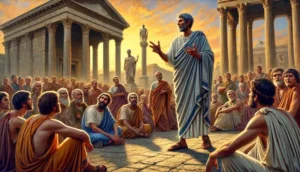In letters from a stoic 18, Seneca begins by asking a question whether we ought to do things that is customary or not. In this letter, he is referring to indulgences on festivals such as drinking and dressing extravagance. He said “It shows much more courage to remain dry and sober when the mob is drunk and vomiting; but it shows greater self-control to refuse to withdraw oneself and to do what the crowd does, but in a different way—thus neither making oneself conspicuous nor becoming one of the crowd. For one may keep holiday without extravagance.” It seems though that he was not totally against these customs, but rather recommends temperance and self-control.
The next key idea is an essential stoic practice – preparing setbacks by simulation. The Stoics negate anxiety by expecting the worst that could happen. The reason is that we become less surprised when we expect setbacks to certainly happen. For example, Seneca and Lucilius are upperclassmen. As most wealthy men think, poverty seems to be a terrifying idea. To face the fear of poverty, Seneca advised Lucilius to simulate it. “Set aside a certain number of days, during which you shall be content with the scantiest and cheapest fare, with coarse and rough dress, saying to yourself the while: ‘Is this the condition that I feared?’”
“Set aside a certain number of days, during which you shall be content with the scantiest and cheapest fare, with coarse and rough dress, saying to yourself the while: ‘Is this the condition that I feared?’”
Seneca Tweet This Quote
The stoics have always recommended facing fear by constant exposure. “ If you would not have a man flinch when the crisis comes, train him before it come” It’s a good way of seeing that our happiness does not really depend on external things and that we could be just as happy with the bare minimum nature requires. There is also an added benefit when we put ourselves in harsh conditions for the purpose of training our mind and body. That is, we become more appreciative of the things we have. “Let us become intimate with poverty, so that Fortune may not catch us off our guard. We shall be rich with all the more comfort, if we once learn how far poverty is from being a burden.”
“ If you would not have a man flinch when the crisis comes, train him before it come”
Seneca Tweet This Quote
In the last part of the letter, he briefly taps on anger and said that all people are not immune to it. Quoting from Epicurus “Ungoverned anger begets madness”. Seneca asked Lucilius to continue to improve his soul and practice self-control to combat anger. As he puts it beautifully “It makes no difference how important the provocation may be, but into what kind of soul it penetrates.” It does not matter what triggers us to be angry. If we don’t practice self-control even the slightest makes us angry.
“Ungoverned anger begets madness”
Seneca Tweet This Quote
“It makes no difference how important the provocation may be, but into what kind of soul it penetrates.”
Seneca Tweet This Quote
***** Letters from a Stoic Key Takeaways is a collection of short key takeaways from the letters sent by Seneca to Lucilius. Read each letter’s key takeways here .




